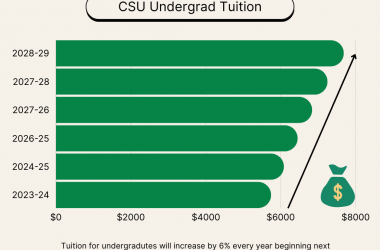The Associated Students Inc. executive director at Cal State Long Beach makes $121,932 a year, making him the fifth-highest paid ASI overseer in the Cal State University system.
ASI organizations are student-government institutions in the CSU that have elected student officials. They also have a full-time overseer that is called an executive director, general manager or adviser.
In a three-week period, the Daily 49er surveyed salaries for the ASI’s overseers.
Duties of the ASI overseers
Richard Haller is CSULB’s ASI executive director, working 27 years for the organization. He supervises six ASI employees and is responsible for overseeing both CSULB’S ASI operations and those at the University Student Union.
Only eight of the CSU’s 23 ASI overseers manage a student government and a building similar to the University Student Union.
Haller said he believes the process of determining CSULB’s ASI salaries is fair. He said that paying ASI employees comparable to what the state pays is necessary to ensure ASI does not lose its employees to the state.
“As our policy states, ASI seeks to be neither the highest nor the lowest paying employers within a labor market area,” Haller said. “The goal is to pay rates that will facilitate the recruitment and retention of a productive management workforce.”
At $124,478, Cheryl Vargas of San Jose State is the fourth-highest paid ASI overseer in the CSU. She said her responsibilities are similar to those of a Chief Operating Officer or CEO of a non-profit organization.
Vargas said that the YMCA in the Bay Area, a non-profit with a similar-size budget to San Jose State’s ASI, pays about 7 percent more than her current salary.
David Crandall, Cal State Northridge’s ASI general manager, makes $98,000 annually. Crandall’s responsibilities include day-to day operations within ASI and offering guidance to elected student leaders.
In an e-mail to the Daily 49er, Crandall said, “I do not think too much about other positions’ pay. I would imagine in a for-profit corporation, the pay would be higher, but more comparable in another not-for-profit. I am paid handsomely.”
Method for determining the ASI overseers’ salaries
Each CSU student-government organization has a different method for determining the salary of its overseer. It is usually based on an individual’s years of experience, years in the position, level of expertise, education, skills, as well as the size of the student government he or she manages, Haller said.
According to Haller, about every three years CSULB’s ASI conducts periodic salary studies. These studies review the ASI’s salaries for managers in comparison with those of non-profit organizations, as well as student-government organizations in the CSU and other colleges.
The human resources committee for CSULB’s ASI is responsible for recommending adjustments to its management’s salaries. These recommendations are then sent to the Board of Control and then to the Senate for review and approval.
In addition to these studies, management salaries are eligible for cost-of-living adjustments and merit-based pay increases. The last time either was implemented at CSULB was July 2007, according to Haller.
The executive director’s minimum-maximum salary range is $78,480 to $151,716, according to the Consolidated Salary Scale for CSULB’s ASI for the 2010-11 fiscal year.
Sources of the overseers’ salaries
Sources of income cover more than 76 percent of the cost of full-time salaries and benefits for CSULB’s ASI, Haller said. These other sources of income include contributions, grants and contracts, user fees and recovered expenses, sales, leases and rentals and income from investments.
Student fees cover the rest of CSULB’s ASI full-time salaries and benefits.
Student governments are auxiliaries of their universities, giving them a degree of freedom and separation from the schools. Most pay their employees from funds separate from university budgets, consisting of student fees, grants and revenue from running services.
But not all the overseers are employed by their respective ASIs. The interim dean of students at Cal State Maritime, Debra Hebert, oversees ASI and is employed by the state, according to the university’s ASI Executive President Sean Connelly.
Hebert’s salary of $42,103 was taken from the Sacramento Bee’s reports on state workers’ salaries.
Top-paid ASI overseers
Richard Johnson, executive director of Cal Poly San Luis Obispo’s ASI, has a salary of $178,494, according to IRS records.
The Daily 49er reported Oct. 4 that Cal Poly San Luis Obispo has the highest-paid ASI president, Sarah Storelli, who has a compensation of $29,121.41.
Storelli was out of the office on Tuesday and unavailable to comment. For the past two weeks, the Daily 49er has been unable to reach Johnson either by phone or e-mail for this story.
San Diego State’s ASI executive director, Dan Cornthwaite, came in second place among the overseers with a salary of $142,502, according to IRS records. Cornthwaite also did not respond to the Daily 49er for this story.
At $26,437, San Diego State’s ASI president, Grant Mack, has the second-highest compensation for his position.
Daily 49er’s survey method
The Daily 49er received the salary numbers for CSU student-government overseers through the Form 990 filed to the IRS by non-profit organizations, provided by guidestar.org.
Eighteen out of the 23 CSU ASI overseers confirmed their salaries. The remaining five declined to do so. This includes Cal Poly San Luis Obispo, San Diego State, Cal State Los Angeles, Cal State Fullerton and San Francisco State.
Fred Sanchez is the executive director of CSU Fullerton’s ASI, making $119,129 as reported in 2008. He refused to confirm his salary numbers, saying it was “confidential” information.
Disclaimer: The Daily 49er is not responsible for Postings made on www.daily49er.wpengine.com. Persons commenting are solely responsible for Postings made on this website. Persons commenting agree to the Terms of Use of the website. If Postings do not abide by the Rules of Conduct or Posting Regulations as listed in the Postings Policy, the Daily 49er has all rights to delete Postings as it deems necessary. The Daily 49er strongly advises individuals to not abuse their First Amendment rights, and to avoid language suggestive of hate speech. This site also encourages users to make Postings relevant to the article or other Postings.




